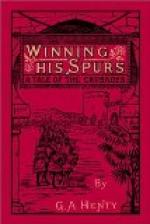The numbers at the beginning of the fight were not unequal, but the men to whom the vessel belonged made but a faint resistance when they perceived that the day was going against them. The men-at-arms, however, consisting of three, who appeared to be the leaders, and of eight pikemen, fought stubbornly and well.
Cuthbert was not long in detecting in the tones of the man who was clearly at the head of affairs the voice of Sir de Jacquelin Barras. To do him justice he fought with extreme bravery, and when almost all his followers were cut down or beaten overboard, he resisted staunchly and well. With a heavy two-handed sword he cleaved a space at the end of the boat, and kept the whole of Cuthbert’s party at bay.
At last Cnut, who had been engaged elsewhere, came to the front, and a tough fight ensued between them.
It might have ended badly for the brave forester, for his lack of armour gave an enormous advantage to his opponent. Soon, however, the count’s foot slipped on the boards of the deck, and before he could recover himself the mace of Cnut descended with tremendous force upon his head, which was unprotected, as he had taken off his casque on arriving at the ship. Without a word or a cry the count fell forward on the deck, killed as a bullock by a blow of a pole-axe.
While this conflict had been going on, occasionally the loud screams of a woman had been heard below.
Cuthbert, attended by Cnut and two of his followers, now descended.
At the bottom of the steps they found a man-at-arms placed at the door of a cabin. He challenged them as they approached, but being speedily convinced that the vessel was in their hands, and that his employer and party were all conquered, he made a virtue of necessity, and laid down his arms.
“You had better go in alone,” Cnut said, “Master Cuthbert. The lady is less likely to be frightened by your appearance than by us, for she must wonder indeed what is going on.”
On entering the cabin, which had evidently been fitted up for the use of a lady, Cuthbert saw standing at the other end the princess whom of course he knew well by sight. A lamp was burning in the cabin, and by its light he could see that her face was deadly pale. Her robes were torn and disarranged, and she wore a look at once of grave alarm and surprise upon seeing a handsomely dressed page enter with a deep reverence.
“What means this outrage, young sir? Whoever you be, I warn you that the King of England will revenge this indignity.”
“Your Highness,” Cuthbert said, “you have no further reason for alarm; the knaves who carried you off from the bishop’s palace and conveyed you to this ship are all either killed or in our power. I am the page of the Earl of Evesham, a devoted follower of King Richard. Some of the designs of the bold men came to the ears of my lord, and he ordered me and a band of his followers to keep good guard over




